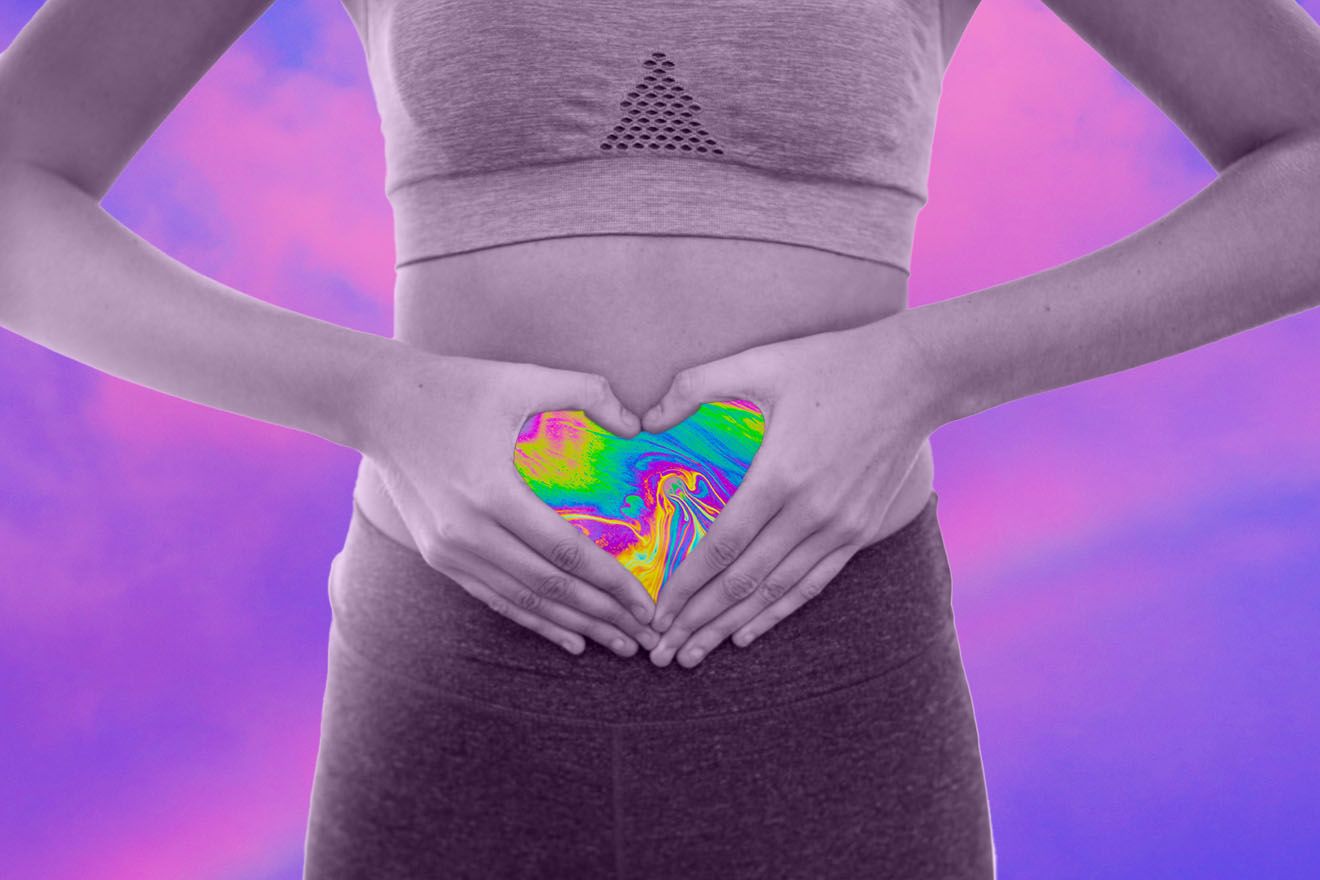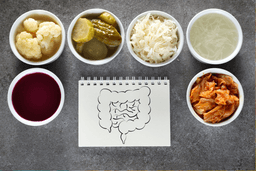“Gut feeling” is more than an idiom – it’s a scientific fact. A growing body of research supports a direct connection between the bacteria in our bellies and our mood. And we know that psychedelics create lasting changes in our brains. Can they also affect the gut? Let’s discuss psychedelic medicines and the gut-brain axis.
Psychedelic Support follows psychedelic medicine research closely. There is exponential growing evidence showing psychedelics could have positive impacts on mental health. But the brain doesn’t exist in a vacuum. How we feel mentally is influenced by our physical health, our nutrition, and more.
Mental diagnoses and physical health problems are closely linked. Patients with an autoimmune condition are more likely to develop mood disorders and clinical depression. Psychedelics may help mental health through not only experiential medicine but as well as anti-inflammatory and immune-modulating effects.1
When prescribing psychedelic therapy, we have to consider the whole patient, not just their mental health diagnosis. How will a psychedelic therapy regimen affect other body systems, like the gut? And how will those changes affect patients? These exploratory questions help us give better care as therapists and achieve a better understanding as psychedelic scholars.
Follow your Curiosity
Sign up to receive our free psychedelic courses, 45 page eBook, and special offers delivered to your inbox.The Gut-Brain Axis and Mental Health
It’s no question that our bellies and our brains share a unique connection. Our GI tract can influence our mental health and vice versa. The growing science of gut health points to this link and how having “good gut health” can improve mental health.
“Gut health” may seem like a vague term. Although many people associate the gut with the stomach, it includes your entire gastrointestinal tract. When any part of this tract is bacterially unbalanced or inflamed, it sends signals back to your brain. Problems with gut health don’t just lead to diarrhea and upset stomach – they’re also linked to mental health.2
When you think of microorganisms, you’re probably thinking of pathogens that make us sick. Yet bacteria, viruses, and parasites live within us all the time. Microorganisms in our bodies outnumber our cells by 10 to 1. But because they’re so small, they make up between 1 and 3% of our body mass.3
These tiny life forms aren’t just hitching a ride. Many of our physiological processes, like digestion, directly depend on microorganisms to get the job done. We don’t naturally have all the enzymes necessary to break down our foods. Microbes in our gut help us process these foods while creating vitamins and anti-inflammatories.1
We also depend on foreign microorganisms for our neurotransmitters. These messengers between neurons influence our mood, thoughts, and personality. 95% of serotonin is found in the gut, affecting our sleep, sexual desire, mood, and more.4
So without good gut health, our bodies may not be getting enough of the chemical messengers it needs.
Gut health, or lack of it, is associated with many of the mental health diagnoses that psychedelic medicine have shown to be effective for. Post-traumatic Stress Disorder, Depression, Substance Use Disorders, and more have been linked to gut problems. Let’s talk about how these diagnoses are associated with the gut-brain axis.
Post-Traumatic Stress Disorder
PTSD is associated with a response to trauma. But it’s also linked to immune dysregulation, meaning that the immune system isn’t working correctly. Immune dysregulation is a component of autoimmune diseases. Scientists have shown that PTSD could also be linked to imbalanced gut microbiota.5
As infants and children, stress-induced gut flora problems may affect our immune function and our susceptibility to PTSD. Problems with gut flora early in life may predispose certain people to PTSD after a traumatic event.4 PTSD is one of the most challenging mental health problems to treat, yet MDMA has had a positive effect in clinical trials.
Depression
As early as 1898, scientists theorized that gut flora was connected to “melancholia” or depression.6 Problems with intestinal permeability, or “leaky gut,” are thought to contribute to inflammation in stress-related depression.7
This creates an opportunity to treat depression both from the neurological and bacterial perspectives. Probiotics have had similar effects to Lexapro in mice studies. And they were more effective than Lexapro at maintaining a healthy weight and metabolism.2
Depression has also been responsive to several psychedelics in research. Psilocybin, ketamine, ayahuasca, and others have shown promising results in trials and anecdotally by many who have tried them.
Substance Use Disorders
Substances like opioids, alcohol, and methamphetamines have negative impacts on the gut. Opioids slow your gut motility, causing constipation and altering absorption. Alcohol abuse leads to a leaky gut and causes shifts in the gut microbiome.8
Fecal Microbiota Transplant (FMT), the process of administering donor feces to a patient to stimulate gut flora has been tried on patients with alcohol use disorder. Patients who received a transplant reduced their cravings by 90%, compared to 30% in the control group.8 These results point to a potential link between an imbalance of gut flora and continuing problems with substance addiction.
For a long time, we thought that mental illness was just that. Now, we understand that mental illness is linked to physical processes like the gut-brain axis. Some fascinating clinical trials are underway right now, looking at treating mental health diagnoses by changing gut microbiota. FMT may sound funny, but it’s a treatment that scientists are exploring for mental illness.9
Yet the gut-brain axis is a two-way street. The most popular treatment for depression, SSRIs, have shown to suppress certain gut bacteria. This may help explain why some patients experience relief from SSRIs for years, only for these positive effects to stop abruptly. The suppression of certain flora may lead to resistance and a resurgence over time.10
If treatments targeting the gut microbiota could influence mental illness, could we go the other way around too? Could psychedelic medicine be a tool for improving gut health through mental health? We know psychedelics impact the serotonin system in the brain in a big way. It seems plausible gut serotonin could also be affected by psychedelics.
Psychedelics and the Gut
Many people who have experienced psychedelics, especially ibogaine and ayahuasca, know that they can have noticeable effects on the gut. These effects manifest in nausea, vomiting, and diarrhea. Vomiting is so integral in ritual ayahuasca ceremonies that this phase of the experience is often called “purging.”11
Scientists believe that this reaction comes from high levels of serotonin in the GI tract, which stimulate the vagus nerve. This is also where your gag reflex comes from. Yet to ayahuasca participants, this reaction is more than that. Many believe that vomiting helps them expel negative emotions from the body.7
These physical symptoms make it evident that psychedelics influence our stomachs. But in the opposite direction, gut health and nutrition also affect the psychedelic experience. Traditional indigenous peoples use a strict diet before ayahuasca ceremonies because the gut influences visionary states.
Nutrition and Psychedelic Therapy
Nutrition has a massive influence on gut flora. Depending on what we eat, we may be feeding “bad” bacteria while neglecting “good” bacteria. A western diet, high in sugars and processed foods, can cause harmful bacteria to flourish.12
Imbalances in gut flora can affect how our stomachs process foods and extract nutrients from them.13 Because many psychedelics are ingested through the GI tract, gut health may influence the psychedelic experience.
Maintaining good gut health could help you or your patients prepare for psychedelic medicine therapy. Learn more about how nutrition influences the psychedelic experience on our blog.
Psychedelics and the Gut-Brain Axis
We don’t yet have strong evidence that psychedelic medicines directly affect the gut microbiota and gut-brain axis. This will be an interesting direction for new clinical trials and future research. But we do know that psychedelics have shown a positive impact on mental health diseases, which could create indirect changes in gut flora.
Research indicates that psychedelic medicine could help in diseases where gut microbiota is affected. MDMA’s positive effect on PTSD could lead to alterations in gut health. Psilocybin therapy for depression could do the same.
None of our body organs work alone. The gut-brain axis is one link in a complex web. When we treat patients with mental illness, we need to understand how other body systems can help or hurt the healing process. While we don’t know yet whether psychedelic medicine affects the gut, we do know that the gut has an effect on mental health.
Helping patients understand their gut health could become an essential component of preparing them for psychedelic therapy. As therapists, we have a duty to integrate evolving research into clinical practice. If you’re looking for evidence-based education that’ll help you practice psychedelic therapy, check out our courses page.
References:
[1] Thompson, C., & Szabo, A. (2020). Psychedelics as a novel approach to treating autoimmune conditions. Immunology Letters, 228, 45–54. https://doi.org/10.1016/j.imlet.2020.10.0
[2] Clapp M, Aurora N, Herrera L, Bhatia M, Wilen E, Wakefield S. Gut microbiota’s effect on mental health: The gut-brain axis. Clin Pract. 2017 Sep 15;7(4):987. doi: 10.4081/cp.2017.987. PMID: 29071061; PMCID: PMC5641835.
[3] U.S. Department of Health and Human Services. (2015, August 31). NIH human microbiome project defines normal bacterial makeup of the body. National Institutes of Health. Retrieved July 11, 2022, from https://www.nih.gov/news-events/news-releases/nih-human-microbiome-project-defines-normal-bacterial-makeup-body#:~:text=The%20human%20body%20contains%20trillions,vital%20role%20in%20human%20health.
[4] Carpenter, D. S. (2012, September). That gut feeling. Monitor on Psychology. Retrieved July 11, 2022, from https://www.apa.org/monitor/2012/09/gut-feeling.
[5] Leclercq S, Forsythe P, Bienenstock J. Posttraumatic Stress Disorder: Does the Gut Microbiome Hold the Key? Can J Psychiatry. 2016 Apr;61(4):204-13. doi: 10.1177/0706743716635535. Epub 2016 Feb 24. PMID: 27254412; PMCID: PMC4794957.
[6] Brower, Auto-Intoxication in its relations to the diseases of the nervous system. JAMA. 1898;XXX(11):575–577. doi:10.1001/jama.1898.72440630001001
[7] Clapp M, Aurora N, Herrera L, Bhatia M, Wilen E, Wakefield S. Gut microbiota’s effect on mental health: The gut-brain axis. Clin Pract. 2017 Sep 15;7(4):987. doi: 10.4081/cp.2017.987. PMID: 29071061; PMCID: PMC5641835.
[8] Simpson, S., Mclellan, R., Wellmeyer, E., Matalon, F., & George, O. (2021). Drugs and bugs: The gut-brain axis and substance use disorders. Journal of Neuroimmune Pharmacology. https://doi.org/10.1007/s11481-021-10022-7
[9] Taylor VH. The microbiome and mental health: Hope or hype? J Psychiatry Neurosci. 2019 Jul 1;44(4):219-222. doi: 10.1503/jpn.190110. PMID: 31245969; PMCID: PMC6606431.
[10] Sjöstedt P, Enander J, Isung J. Serotonin Reuptake Inhibitors and the Gut Microbiome: Significance of the Gut Microbiome in Relation to Mechanism of Action, Treatment Response, Side Effects, and Tachyphylaxis. Front Psychiatry. 2021 May 26;12:682868. doi: 10.3389/fpsyt.2021.682868. PMID: 34122195; PMCID: PMC8187765.
[11] Fotiou, E., & Gearin, A. K. (2019). Purging and the body in the therapeutic use of ayahuasca. Social Science & Medicine, 239, 112532. https://doi.org/10.1016/j.socscimed.2019.112532
[12] Satokari R. High Intake of Sugar and the Balance between Pro- and Anti-Inflammatory Gut Bacteria. Nutrients. 2020 May 8;12(5):1348. doi: 10.3390/nu12051348. PMID: 32397233; PMCID: PMC7284805.
[13] Zhang YJ, Li S, Gan RY, Zhou T, Xu DP, Li HB. Impacts of gut bacteria on human health and diseases. Int J Mol Sci. 2015 Apr 2;16(4):7493-519. doi: 10.3390/ijms16047493. PMID: 25849657; PMCID: PMC4425030.







